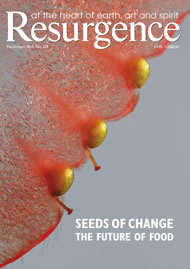Why should we be interested in the ancient world – especially the pre-classical civilisations of ancient Egypt and Mesopotamia? Does the ancient world have any relevance to us today? I fear most of us would answer in the negative. We see the past as not only dead and gone but of marginal relevance to our lives in the 21st century. Our modern belief in progress has encouraged us to discard the past, thinking that we have moved beyond it and superseded it. The past, however, has a tendency to haunt the present, and it is perhaps not so easy to shake off as we might think. This is because the past belongs to and interpenetrates the present in subtle and powerful ways. It is the ‘unconscious’ of the present, and our neglect of it becomes a neglect of an aspect of our own wholeness.
The dimension in which the past exists is the dimension of depth. It is our own psychic and spiritual depth, and the further back we go into the past, the deeper we go psychically and spiritually; for in the cultures of antiquity we find a living world of gods and spirits, and inner realms invisible to the eye. We are taken less ‘back’ than ‘down’ to a kind of knowledge, or a kind of truth, that requires us to retrace our steps, as we remember what we already know but have forgotten.
It is significant that the Egyptians saw the Greeks as younger than themselves, younger in the sense of being younger in spirit, because they were so much more extroverted. An ancient Egyptian priest complained to the Greek sage Solon: “You Greeks are just children. There is no-one old among you!” It is a rebuke that we might well take to heart today. Contemporary tribal peoples have a similar perception of modern Western culture. The Kogi of the Colombian Sierra Nevada, for instance, call Westerners the “younger brother”.
Youthfulness is characterised by not having a past. Like the Greeks, we, today, are a youthful culture. But whereas the Greeks were generally reverential towards the cultures that preceded them, we tend to disparage them, thinking that we have advanced beyond them. Francis Bacon established the modern attitude when he wrote (as a belated rebuff to the Egyptian priest) that, no, it was the ancients who were like children compared to us moderns. Bacon introduced a novel condescension and disdain towards the past, that was accompanied by a shift in the kind of knowledge that was valued. The ‘new knowledge’ that Bacon and others championed was knowledge that cut out all traditional wisdom handed down from the past, in order to start again with new systematic research programmes based on empirical observation and experiment. The aim was to gain power over Nature in order to serve the material rather than the spiritual benefit of humanity.
Yet for all the material benefits that the new knowledge has brought us since the watershed of the 17th century, there has been a heavy cost. When we look around us, we see an afflicted world – we see dying rivers and oceans, forests destroyed, species becoming extinct, ever more people crowded into ugly, sprawling cities, and so many areas of modern life infected by a creeping soullessness. Leading representatives of the new knowledge assert that there is no reality other than what has material existence, and promulgate the view that human beings are merely biological machines whose lives are essentially purposeless.
From such a standpoint, the cultures of the past, with their sensitivity to subtle realms and their pantheons of gods and spirits, were simply ignorant and superstitious. This, however, is far from the truth. The cultures of antiquity, like many of today’s surviving traditional cultures, were wise and knowledgeable about things of which we, today, are but dimly aware. Contemporary mainstream culture is still balefully ignorant of the spiritual dimension of life, rarely questioning the modern superstition that only material existence has reality; and barely able to consider the possibility that its reduced view of reality may have contributed to the troubles – both outer and inner – that we face today.
The world of the ancients has much to teach us about things we have forgotten and which we would do well to remember, for unless the new knowledge is tempered by the old, the path of modern science and technology will leave an ever greater legacy of devastation in its wake. This is less a question of simply knowing about the past, like some exotic but alien “Other” to be studied academically, than of taking the experiential world of the past seriously, as something that in the end belongs to ourselves – for it was a world that included dimensions of existence that we spurn at our own peril. We would do well to revisit these dimensions of existence, acknowledge their validity once more, and reintegrate them.
This is not to say that we should reject the present or try to ‘go back’ to an earlier age; it is more about growing out of our youthful enthralment with the present, and growing down into our oldness. It is about recognising that we need to reclaim the past as part of who we are, because it belongs intimately to our own larger identity. Through integrating our historical, and indeed our pre-historical, unconscious, we deepen ourselves; we equip ourselves with a standard by which to judge the present; and we become better able to go forward with wisdom into the future.







